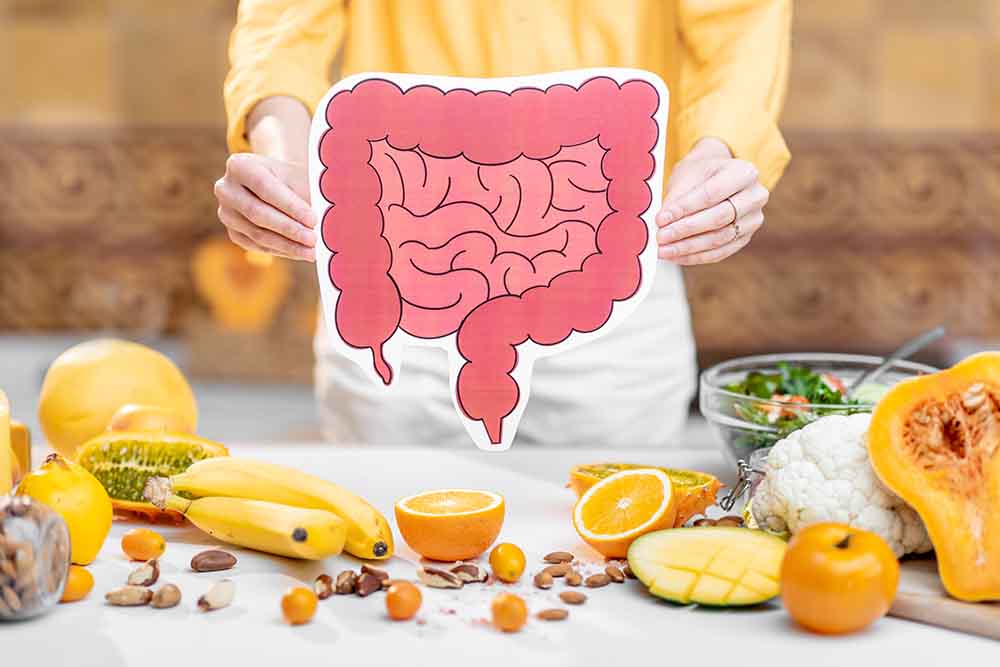The foods you consume have a direct and significant impact on the health of your gut. Your digestive system is home to trillions of bacteria that play a vital role in digestion, immunity, and overall well-being. When you eat gut healthy foods, you promote the growth of beneficial bacteria, which aids digestion, reduces inflammation, and enhances nutrient absorption. Conversely, processed foods, excess sugar, and unhealthy fats can upset the balance of gut bacteria, leading to digestive issues, bloating, and even chronic conditions like irritable bowel syndrome (IBS). In short, eating the right foods is crucial for maintaining a healthy gut and improving digestion.
10 Amazing Gut Healthy Foods
1. Yogurt
Yogurt is one of the most well-known stomach-friendly foods, packed with probiotics that support gut health. Probiotics are live bacteria that can help balance the gut microbiome, making yogurt a natural solution for improving digestion and alleviating bloating or discomfort. Opt for plain, unsweetened yogurt to avoid added sugars that can harm the gut. For an extra gut-health boost, choose yogurt with active and live cultures.
2. Apple Cider Vinegar
Apple cider vinegar (ACV) is a fantastic addition to any diet for better digestion. It contains acetic acid, which can aid in breaking down food and improving stomach acid production. This makes ACV beneficial for those with low stomach acid or acid reflux. It can also support healthy bacteria in the gut and help maintain balanced blood sugar levels. Just be sure to dilute it with water before consuming, as its acidity can harm tooth enamel if consumed directly.
3. Bone Broth
Bone broth is rich in collagen and gelatin, two nutrients that help repair and maintain the gut lining. A strong gut lining is crucial for preventing conditions like leaky gut, where toxins and undigested food particles can pass into the bloodstream, leading to inflammation. Additionally, bone broth is easy to digest and soothing to the stomach, making it an ideal food for those with digestive issues.
4. Soybeans
Soybeans and fermented soy products like miso and tempeh are excellent for gut health. They are packed with fibre, which feeds beneficial gut bacteria, and contains prebiotics that promotes the growth of these good bacteria. Additionally, soybeans are rich in protein and essential nutrients, making them a versatile option for boosting digestion and maintaining a healthy gut.
5. Oats
Oats are a fantastic source of soluble fibre, particularly beta-glucan, which is known to enhance digestion. This type of fibre forms a gel-like substance in the gut, helping to regulate bowel movements and feeding beneficial bacteria. Oats can also lower cholesterol levels and improve heart health. Whether eaten as oatmeal or added to smoothies, oats are one of the best foods for digestion and overall gut health.

6. Kimchi
Kimchi, a traditional Korean fermented vegetable dish, is loaded with probiotics and fibre. The fermentation process increases the beneficial bacteria content, which can improve gut microbiota balance. Kimchi also contains antioxidants, vitamins, and minerals that promote overall health. Its rich probiotic content can help alleviate constipation, boost immunity, and reduce inflammation, making it a must-have in a gut-healthy food.
7. Kombucha
Kombucha is a fermented tea drink that is rich in probiotics, which support a healthy gut microbiome. It contains strains of bacteria and yeast that help maintain the balance of good bacteria in the gut, improving digestion and preventing gut-related disorders. Kombucha also provides a refreshing alternative to sugary drinks and is packed with antioxidants that reduce inflammation.
8. Dragon Fruit
Dragon fruit, also known as pitaya, is a tropical fruit that’s high in fibre and prebiotics. Prebiotics serve as food for the probiotics in your gut, helping to maintain a healthy microbiome. Dragon fruit also contains a wealth of vitamins, minerals, and antioxidants that promote digestion and overall health. Its fibre content helps regulate bowel movements and prevent constipation.
9. Mushrooms
Mushrooms are a gut-friendly food that offers prebiotic benefits. They contain beta-glucan, a type of soluble fibre that promotes the growth of beneficial bacteria in the gut. Varieties like shiitake, reishi, and maitake are particularly known for their gut-healing properties. Mushrooms also have anti-inflammatory and immune-boosting benefits, making them a nutritious and versatile addition to your diet for better digestion.
10. Brown Rice
Brown rice is a whole grain that provides a good amount of dietary fiber, which is essential for promoting digestive health. It helps regulate bowel movements, prevents constipation, and feeds beneficial gut bacteria. Unlike refined white rice, brown rice retains its nutrient-rich bran and germ layers, making it a more nutritious and gut-friendly option. Its complex carbs provide a slow release of energy, keeping your gut and metabolism balanced.
Other Factors That Impact Gut Health
While food plays a central role in gut health, other factors can also influence the balance of bacteria in the digestive system. Stress, for instance, can significantly disrupt gut health by increasing inflammation and weakening the gut lining. Lack of sleep is another major contributor to poor gut health, as it impairs the body’s ability to repair and restore itself, including the digestive tract. Additionally, antibiotics, though necessary for treating bacterial infections, can wipe out both harmful and beneficial bacteria, leading to an imbalance in the gut microbiome.
Exercise is another factor that can positively impact gut health. Regular physical activity helps stimulate digestion and improves the movement of food through the intestines. Hydration is also essential, as water helps with digestion by breaking down food and aiding the absorption of nutrients.
Lastly, a diet high in processed foods, sugar, and unhealthy fats can negatively affect the gut. These foods promote the growth of harmful bacteria and contribute to inflammation, while also starving the beneficial bacteria that support digestion. To maintain optimal gut health, it's crucial to address all these factors in combination with a gut-friendly diet.

How to Incorporate These Foods into Your Daily Diet
Incorporating gut-healthy foods into your daily diet is simpler than it may seem. Start your day with a bowl of oatmeal topped with yogurt and fresh fruits like dragon fruit for a nutrient-packed breakfast. A midday snack of kombucha or a small serving of kimchi can provide a probiotic boost while adding variety to your meals. Try adding bone broth to soups or sipping it as a warm beverage, especially if you struggle with digestive issues.
For healty snacks, lunch or dinner, swap white rice for brown rice, and include mushrooms in stir-fries, salads, or pasta dishes. You can also add apple cider vinegar to your salad dressings or dilute it in water as a pre-meal digestive aid. Fermented soy products like miso and tempeh can easily be added to soups or sautéed with vegetables for a nutritious and gut-friendly meal. Finally, try experimenting with smoothies that include oats, yogurt, and even a splash of apple cider vinegar for an easy way to combine several gut-healthy foods.
Conclusion
Your gut health is fundamental to your overall well-being, influencing not only digestion but also immunity, mental clarity, and even mood regulation. The digestive system, often referred to as the "second brain," houses trillions of bacteria that play a crucial role in breaking down food, absorbing nutrients, and protecting against harmful pathogens. By consciously choosing gut-healthy foods like yogurt, kimchi, and brown rice, you nurture these beneficial bacteria, promoting a healthy gut environment that supports efficient digestion and better nutrient absorption.
A balanced gut microbiome helps reduce bloating, improves regularity, and can alleviate symptoms of digestive disorders like IBS. Incorporating these foods into your meals consistently can also lead to improved immunity, better skin health, and enhanced mental clarity, as gut health is closely linked to overall bodily functions.
In addition to diet, lifestyle factors such as stress management, regular exercise, and adequate hydration play key roles in maintaining a healthy digestive system. Chronic stress and poor sleep patterns can negatively affect gut health by weakening the gut lining and disrupting the microbiome balance, while staying hydrated helps the digestive tract function smoothly. Exercise, meanwhile, supports digestion by improving gut motility and reducing inflammation. When combined with a diet rich in stomach-friendly, nutrient-dense foods, these habits can create a robust environment for your gut to thrive, leading to long-term health benefits.
Prioritising gut health not only enhances digestion but also fosters an overall sense of well-being that supports physical, mental, and emotional health.
FAQs
How long does it take for gut-healthy foods to improve digestion?
Gut-healthy foods can start showing positive effects on digestion in as little as a few days to a week, depending on individual factors like your current diet, gut health, and lifestyle habits.
Can apple cider vinegar be taken every day?
Yes, apple cider vinegar can be consumed daily, but it should be diluted with water to prevent damage to your teeth and stomach lining. About 1-2 tablespoons in a glass of water before meals is typically safe.
What are prebiotics and probiotics?
Probiotics are live bacteria that help balance the gut microbiome, while prebiotics are non-digestible fibres that feed these beneficial bacteria, promoting their growth.
Are all fermented foods good for gut health?
Most fermented foods like yogurt, kimchi, and kombucha are excellent for gut health due to their probiotic content. However, some commercially processed fermented foods may contain added sugars or preservatives, which can counteract their benefits.